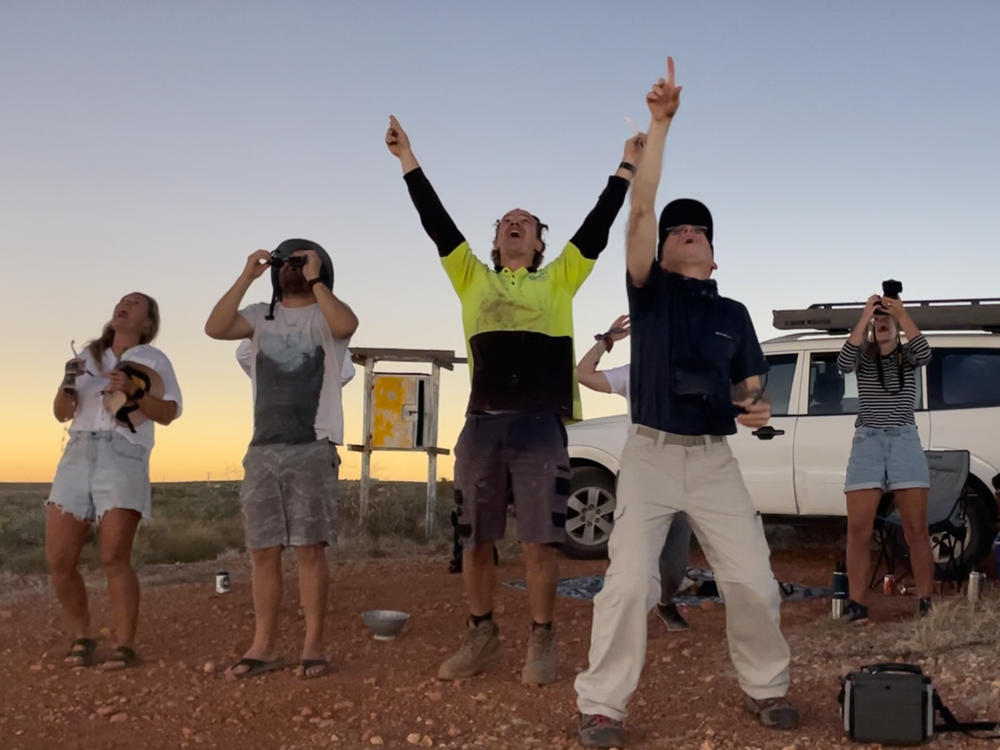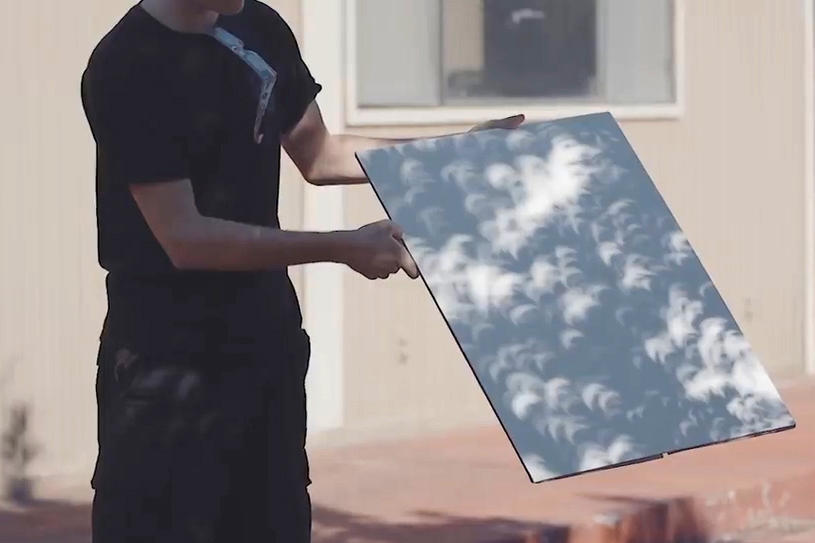Section Branding
Header Content
The weird and wonderful sensations of viewing a total solar eclipse
Primary Content
David Baron can pinpoint the first time he got addicted to chasing total solar eclipses, when the moon completely covers up the sun. It was 1998 and he was on the Caribbean island of Aruba. "It changed my life. It was the most spectacular thing I'd ever seen," he says.
Baron, author of the 2017 book American Eclipse: A Nation's Epic Race to Catch the Shadow of the Moon and Win the Glory of the World, wants others to witness its majesty too. On April 8, millions of people across North America will get that chance — a total solar eclipse will appear in the sky. Baron promises it will be a surreal, otherworldly experience. "It's like you've left the solar system and are looking back from some other world."
The total eclipse can be viewed starting from Mexico through Texas and up to Maine and parts of Canada. This swath of land that will see a total eclipse is called the "path of totality." Those who live outside this area will see a partial eclipse, in which the moon blocks anywhere from a little bit to almost all of the sun.
If you live outside the path of totality, Baron urges you to find a way to go and see the total eclipse. "You are absolutely not too late. You could just decide, wherever you are in the country, to hit the road at midnight and drive 10 hours to get [there]," he says.
Baron, who is a former NPR science reporter, talks to Life Kit about what to expect when viewing a total solar eclipse, including the sensations you may feel and the strange lighting effects in the sky. This interview has been edited for length and clarity.
What does it feel like to experience a total solar eclipse — that moment when the moon completely covers up the sun?
It is beautiful and absolutely magnificent. It comes on all of a sudden. As soon as the moon blocks the last rays of the sun, you're plunged into this weird twilight in the middle of the day. You look up and the blue sky has been torn away. On any given day, the blue sky overhead acts as a screen that keeps us from seeing what's in space. And suddenly that's gone. So you can look into the middle of the solar system and see the sun and the planets together.
Can you tell me about the sounds and the emotions you're feeling?
A total solar eclipse is so much more than something you just see with your eyes. It's something you experience with your whole body. [With the drop in sunlight,] birds will be going crazy. Crickets may be chirping. If you're around other people, they're going to be screaming and crying [with all their emotions from seeing the eclipse]. The air temperature drops because the sunlight suddenly turns off. And you're immersed in the moon's shadow. It doesn't feel real.
In your 2017 Ted Talk, you said you felt like your eyesight was failing in the moments before totality. Can you go into that a little more?
The lighting effects are very weird. Before you get to the total eclipse, you have a progressive partial eclipse as the moon slowly covers the sun. So over the course of an hour [or so], the sunlight will be very slowly dimming. It's as if you're in a room in a house and someone is very slowly turning down the dimmer switch. For most of that time your eyes are adjusting and you don't notice it. But then there's a point at which the light's getting so dim that your eyes can't adjust, and weird things happen. Your eyes are less able to see color. It's as if the landscape is losing its color. Also there's an effect where the shadows get very strange.
You see these crescents on the ground.
There are two things that happen. One is if you look under a tree, the spaces between leaves or branches will act as pinhole projectors. So you'll see tiny little crescents everywhere. But there's another effect. As the sun goes from this big orb in the sky to something much smaller, shadows grow sharper. As you're nearing the total eclipse, if you have the sun behind you and you look at your shadow on the ground, you might see individual hairs on your head. It's just very odd.
Some people might say that seeing the partial eclipse is just as good. They don't need to go to the path of totality.
A partial solar eclipse is a very interesting experience. If you're in an area where you see a deep partial eclipse, the sun will become a crescent like the moon. You can only look at it with eye protection. Don't look at it with the naked eye. The light can get eerie. It's fun, but it is not a thousandth as good as a total eclipse.
A total eclipse is a fundamentally different experience, because it's only when the moon completely blocks the sun that you can actually take off the eclipse glasses and look with the naked eye at the sun.
And you will see a sun you've never seen before. That bright surface is gone. What you're actually looking at is the sun's outer atmosphere, the solar corona. It's the most dazzling sight in the heavens. It's this beautiful textured thing. It looks sort of like a wreath or a crown made out of tinsel or strands of silk. It shimmers in space. The shape is constantly changing. And you will only see that if you're in the path of the total eclipse.
So looking at a partial eclipse is not the same?
It is not at all the same. Drive those few miles. Get into the path of totality.
This is really your chance to see a total eclipse. The next one isn't happening across the U.S. for another 20 years.
The next significant total solar eclipse in the United States won't be until 2045. That one will go from California to Florida and will cross my home state of Colorado. I've got it on my calendar.
Why is it your life mission to get as many people to experience a total solar eclipse?
I was given the advice back in 1994 by Jay Pasachoff, a solar astronomer at Williams College. He was the biggest eclipse evangelist ever. He went to every solar eclipse. Partly because it was his study, but also he just loved the experience.
[He told me that] before I die, I owe it to myself to see a total eclipse. And I went to see my first total eclipse. He was so right.
I am so grateful to Jay, who died a little over a year ago. I see it as my responsibility to pass this on to others. Not everyone becomes an eclipse chaser. But I don't know anyone who's seen a total eclipse who hasn't been bowled over by it and hasn't been grateful they were encouraged to go see it.
Listen to the podcast episode for more information on eclipse-viewing equipment and viewing sites.
The digital story was written by Malaka Gharib and edited by Sylvie Douglis and Meghan Keane. The visual editor is Beck Harlan. We'd love to hear from you. Leave us a voicemail at 202-216-9823, or email us at LifeKit@npr.org.
Listen to Life Kit on Apple Podcasts and Spotify, and sign up for our newsletter.
Correction
In a previous audio version of this story, we made reference to an upcoming 2025 total solar eclipse. The solar eclipse in question will take place in 2045.



